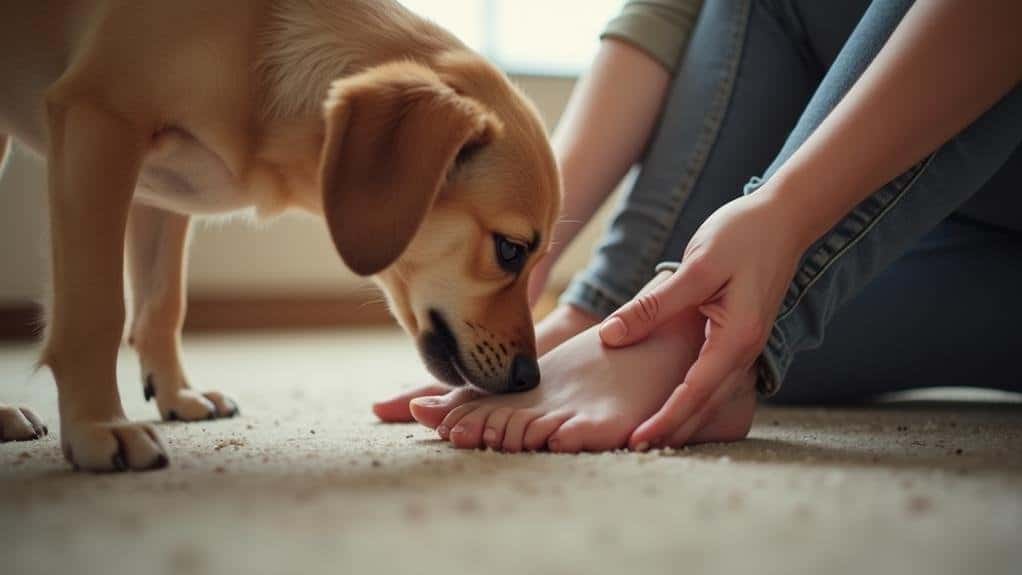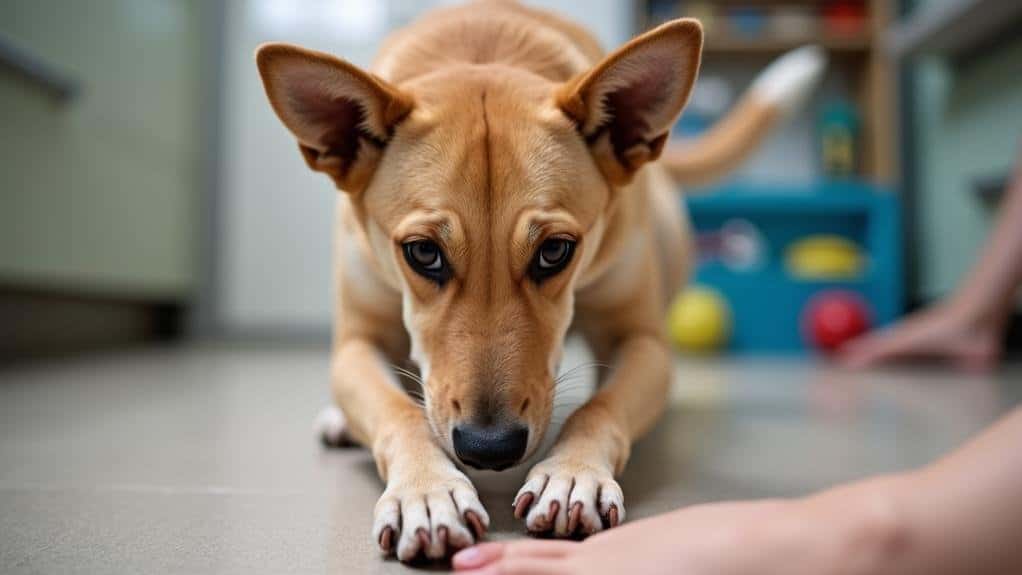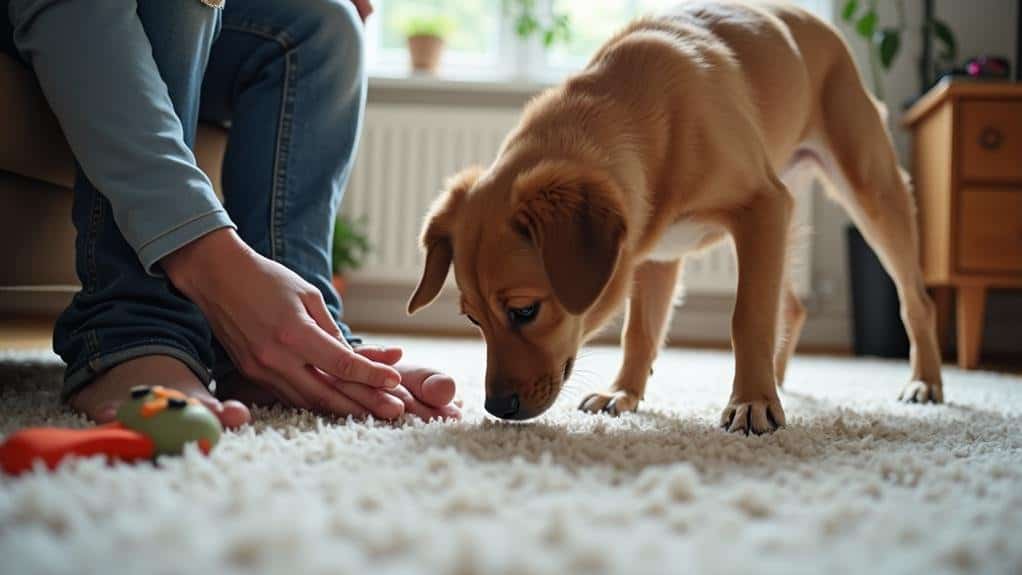Your dog’s obsession with your feet is rooted in their exceptional sense of smell and natural instincts.
Dogs can detect scents 10,000 to 100,000 times better than humans, and your feet emit a unique blend of sweat, oils, and pheromones.
This foot fascination allows your furry friend to gather information about your emotions and well-being.
It’s also a way for them to bond with you and feel secure.
While generally harmless, excessive foot-focused behavior might indicate underlying health issues or anxiety.
Understanding this canine behavior can help you better manage it and strengthen your bond.
Discover how to nurture this natural curiosity while maintaining healthy boundaries.
Canine Sensory Exploration

A dog’s sensory world is vastly different from our own, especially when it comes to their remarkable sense of smell. Your furry friend’s olfactory abilities are 10,000 to 100,000 times more acute than yours, making your feet an intriguing source of information.
When your dog shows an interest in your feet, they’re engaging in sensory exploration, gathering data about you and their environment. Your feet emit a variety of scents, including pheromones from sweat and oils, which can attract your dog’s curiosity.
Licking and sniffing your feet allows them to process these smells and gather information about your emotional state and recent activities. This behavior is a natural part of their exploration instinct and helps them understand their surroundings better.
Moreover, your dog’s fascination with your feet can be a way to bond with you. The act of licking or gently nibbling on your feet provides comfort and reinforces your connection.
It’s important to recognize that this behavior is often rooted in your dog’s innate need to explore and interact with their world through their senses, particularly their powerful sense of smell.
Instinctual Behaviors and Foot Attraction

While your dog’s sensory exploration explains part of their foot fascination, instinctual behaviors play a significant role too.
Dogs have inherited survival instincts from their ancestors, driving them to investigate scents on the ground, particularly those from feet. These smells provide valuable information about their environment and the humans in it.
Your dog’s natural inclination to lick and interact with feet stems from their acute sense of smell, which is thousands of times more sensitive than yours. The unique combination of sweat, oils, and pheromones emitted by your feet is irresistible to them.
This behavior also serves as a form of communication and affection, allowing your dog to bond with you and understand your emotional state.
For many breeds, especially those with herding instincts, foot attraction is deeply ingrained. They may view your feet as a way to monitor and manage your movements, fulfilling their instinctual roles.
Additionally, your feet represent a source of comfort and security for your dog, as they seek proximity to you and interpret foot interaction as a sign of closeness and reassurance.
Communication Through Foot Interaction

Canine communication often involves a surprising focus on human feet. Your furry friends use this behavior as a member of their complex social language. When your dog seems to focus on your feet, they’re actually gathering valuable information about your physiological and social state.
Dogs can feel your mood through subtle foot movements, which signal your intentions and readiness for interaction. By observing your feet, they gauge your interest in play or attention, enhancing their understanding of your emotional state.
The smell and taste of your feet provide additional cues, as they emit unique scents and pheromones that dogs interpret to assess your well-being.
Licking your feet isn’t just a quirky habit; it’s a form of non-verbal communication. This behavior can express affection, seek closeness, or indicate that your dog is anxious or stressed. By understanding the context of these interactions, you can better interpret your dog’s needs and strengthen your bond.
To maintain healthy communication, respond to foot-focused behavior with positive reinforcement when appropriate. This approach will help you and your dog develop a deeper understanding of each other’s cues and intentions.
Health and Behavioral Considerations

Delving into the health aspects of canine foot fascination reveals significant considerations for pet owners. While occasional dog licking may seem harmless, excessive licking or nosing of your feet can indicate underlying health issues or behavioral problems.
It’s essential to differentiate between affectionate gestures and potentially problematic behaviors that might stem from stress, anxiety, or discomfort.
If you notice your dog excessively licking their own paws or your feet, consider these potential causes:
- Allergies causing skin irritation and itchiness
- Pain or discomfort in the paws or joints
- Anxiety or stress manifesting as compulsive behavior
- Boredom or attention-seeking behavior
Regular foot checks can help you identify any allergens or irritants affecting your dog’s health. If the behavior persists, consult your veterinarian to rule out medical issues.
Remember, addressing these concerns early on is fundamental for your dog’s emotional well-being and overall health.
To manage excessive licking, implement positive reinforcement techniques and provide distractions. By redirecting your dog’s attention and rewarding calm behavior, you’ll foster a healthier relationship while addressing potential underlying issues.
Stay attentive to your dog’s needs and seek professional help when necessary to guarantee their comfort and happiness.
Managing Foot-Focused Behaviors

Managing foot-focused behaviors in dogs requires a multi-faceted approach. To effectively address this issue, you’ll need to employ various strategies that focus on positive reinforcement and redirection.
When your dog begins licking or nibbling at your feet, don’t reward the behavior with attention. Instead, redirect their focus to a toy or engaging activity. Consistently praising and treating your dog when they choose their toys over your feet will reinforce desired behaviors.
Keep your dog mentally and physically stimulated through regular exercise and interactive playtime. This helps reduce boredom and anxiety, which can contribute to foot obsessions.
Provide a variety of toys to maintain your dog’s interest and engagement throughout the day.
If the behavior becomes excessive or difficult to manage, don’t hesitate to seek help from a professional dog trainer or behaviorist. They can offer tailored strategies to address your specific situation.
Frequently Asked Questions
Why Does My Dog Have an Obsession With My Feet?
Your dog’s foot obsession stems from several factors. They’re attracted to unique scents on your feet, seeking communication and bonding. The taste of sweat and salt appeals to them, and it satisfies their instinctual curiosity for scent exploration.
Why Does My Dog Like My Stinky Feet?
Your dog’s attraction to your stinky feet stems from the unique smells and pheromones in your sweat. They’re drawn to the salty taste and the scent glands in your feet, satisfying their natural curiosity and desire for interaction.
Why Do Dogs Sniff Human Feet?
Dogs sniff your feet because they’re investigating your unique scent. Your feet produce strong odors that intrigue them. They’re gathering information about your mood and health. It’s also a way they interact and bond with you.
Why Does My Dog Get Excited When He Licks My Feet?
Your dog gets excited when licking your feet due to the intriguing scents and tastes they offer. It’s a way for them to bond with you, gather information, and release endorphins, making it a pleasurable experience for them.
Conclusion
Your dog’s foot fascination is a mix of instinct, curiosity, and communication.
While it’s usually harmless, excessive focus might signal underlying issues.
You can manage this behavior through training and redirection.
Remember, your feet are an intriguing source of scent and information for your pup.
If you’re concerned, consult a vet or behaviorist. Embrace your dog’s quirks, but set boundaries to guarantee a balanced relationship.
Your furry friend’s foot obsession is just another way they show interest in you!
